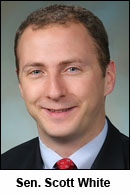OPINION
Renew stadium taxes for jobs, arts, housing
With continued high unemployment and an economy on a slow path to recovery, now more than ever voters expect their elected officials to find innovative ways to spur job creation and economic growth.
Senate Bill 5958 would direct some expiring stadium taxes to new job-creating programs. This is a genuine opportunity to leverage dollars from the tourism industry to prevent the elimination of our arts and cultural programs, to provide work-force housing for working families, and to make smart investments in needed infrastructure that will create thousands of living-wage jobs and have a compounding positive effect throughout our regional economy.
The challenges we face are great. We know 51,000 local construction jobs were lost in this last recession. We also know that a huge funding source for arts and heritage programs in King County will disappear next year, leaving many of our vibrant communities without the rich cultural opportunities that make Seattle and King County one of the most desirable places to live in the country.
Add to the mix the fact that, in the coming days, lawmakers will be finalizing a budget that makes heartbreaking cuts many of us never thought we’d be forced to consider, much less vote for.
The budget before lawmakers is a document of necessity, reflecting the priorities necessary to maintain a basic level of core state services. Funding for basic education will always come before that of the arts — as it absolutely should — but the underlying challenge of preserving the legacy of our great state for future generations remains.
In the face of these cuts, less critical but still extremely important investments — such as funding for heritage and arts programs and down payments on economic-development projects — have been all but thrown out the window.
SB 5958 redirects two tourism-related taxes — a 0.5% restaurant tax and a 2% car-rental tax — away from stadiums in order to save important services and economic-development projects. The taxes will expire in 2015, as originally scheduled.
Nearly 8,000 new jobs in the construction, hospitality and service industries will be created with continued work on the Washington State Convention Center. Notably, the expanded convention center will bring an additional 130,000 visitors (and their money) to the region each year. And by preserving funding for arts and cultural programs, King County will continue to enjoy the $1.75 billion in annual business activity from the sector, as well as the 30,000 jobs the arts provide to our region. Obviously, the economic multiplier will be huge.
The new plan I have introduced enjoys broad and enthusiastic support from a diverse set of interests, including the Greater Seattle Chamber of Commerce, the restaurant and hospitality industry, organized labor, housing advocates, arts organizations, and local elected officials who see the benefits these investments will bring to our communities.
Much has been said about keeping promises. When the Legislature first adopted the temporary taxes on tourist activities for King County in 1995, the expectation was that they would expire in 2015. In the face of these difficult times, I and many of my colleagues made a promise to our constituents and to all Washingtonians to help working families and businesses make it through this recession.
This new proposal keeps both commitments.
We simply cannot afford to ignore this opportunity when so much is at stake.
Sen. Scott White (D-Seattle) represents the 46th Legislative District in North Seattle. He is Senate majority whip and vice chair of the Transportation Committee.
This column also appears in today’s edition of The Seattle Times. It is reposted with the author’s permission.






